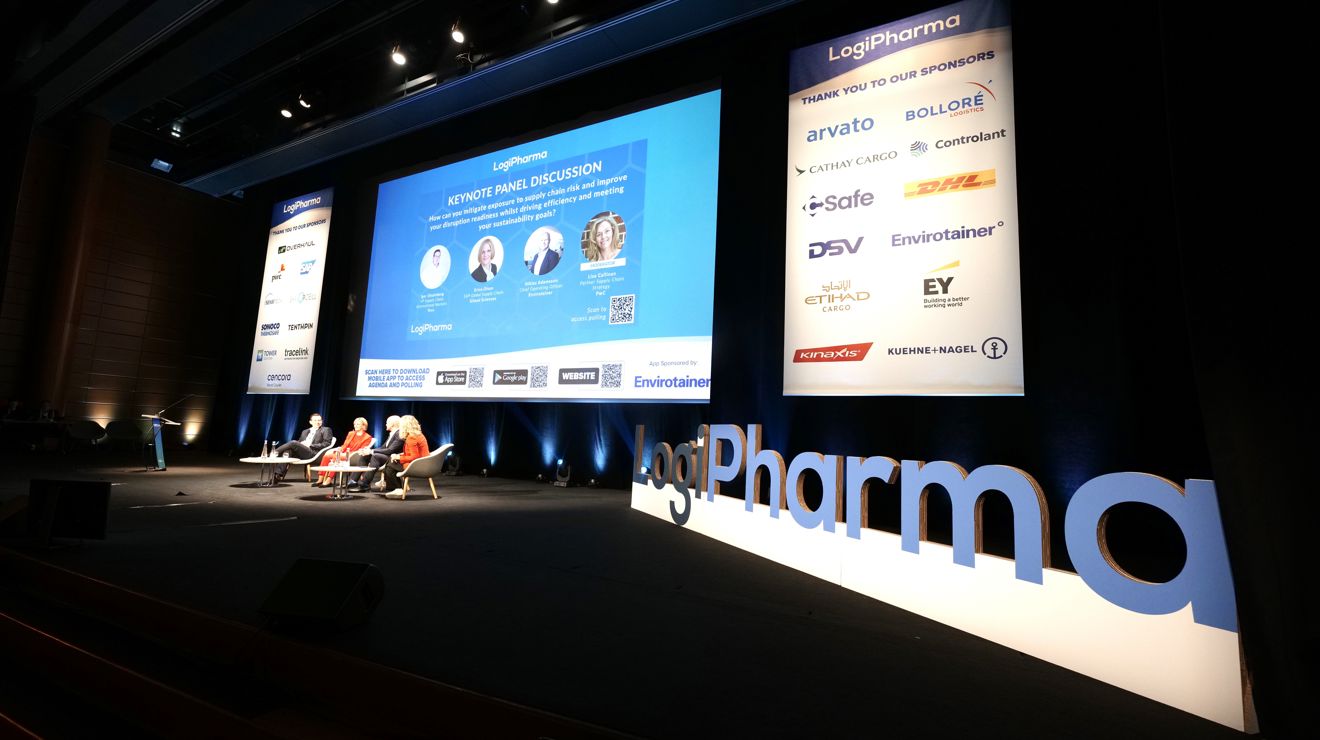Logipharma 2024 Insights: Building Resilient Pharmaceutical Supply Chains
Catherine Taylor
Communication & Content Manager

Centred around the urgent need for supply chain resilience, particularly in the context of current global geopolitical tensions, we wanted to highlight some of our key takeaways from the presentations and panel discussions at Logipharma 2024 about how to ensure uninterrupted access to life-saving medicines and vaccines globally.
In her keynote presentation, Bala Sreenivasan, SVP Global Supply Chain - MSD shared some of the strategies that MSD use to ensure the seamless flow of life-saving medicines and vaccines to patients worldwide. She highlighted the importance of resilience in supply chain strategy, emphasizing its role in mitigating disruptions and ensuring uninterrupted access to essential medicines.
Companies are expected to lose 6-10% of their revenue if they do not set up a resilient supply chain. Bala Sreenivasan, SVP Global Supply Chain - MSD
Many organizations currently work reactively, however with the number of disruptions increasing and becoming more unpredictable and larger in magnitude, Ms Sreenivasan outlined three key pillars that are essential for building robust supply chains:
Absorptive capacity – recognizing and utilizing new knowledge or information to address risks within the supply chain.
Adaptive capacity – adjusting your operations, processes, and strategies in response to changing circumstances or risks in the supply chain.
Transformative capacity – proactively innovating and making fundamental changes to your supply chain structure or processes to mitigate risks and enhance resilience.
From strengthening inventory management to fostering strategic collaborations and leveraging digital technologies, each aspect plays a pivotal role in enhancing supply chain resilience.
Ms Sreenivasan also shared examples with the audience which illustrate MSD's proactive approach to resilience-building. Initiatives such as real-time tracking of critical shipments and centralized material management practices reinforce the company's commitment to safeguarding product integrity and ensuring timely delivery to patients in need.
The presentation also highlighted the importance of not only addressing operational challenges but also advancing resilience in terms of access to medicines. By harnessing innovative solutions like drone delivery technology, MSD aims to bridge gaps in healthcare access, particularly in remote and underserved communities.
Looking ahead, Ms Sreenivasan emphasized the need for continual adaptation and innovation in the face of evolving complexities. As pharmaceutical products and supply chains grow increasingly complex, embracing digital solutions and fostering a culture of resilience will be paramount to delivering uninterrupted access to life-saving medicines and vaccines globally.
Following on from the session, the keynote panel took this topic one step further to discuss how to ensure supply chain readiness whilst still driving efficiency and sustainability goals. Lisa Callinan, Partner Supply Chain Strategy – PwC (Moderator) strongly reflected on the current geopolitical instability, cyberattacks, and political conflicts, all of which can profoundly impact supply chains, especially within the life sciences sector.
Sharing recent results from a survey conducted by PwC, Ms Callinan revealed that CEOs are increasingly facing the need for business model reinvention, with over 85% acknowledging the requirement for adaptation. Despite this, there is a cautious optimism within the industry regarding the resilience of supply chains, encouraged by past performance during significant disruptions, in particular during the Covid 19 pandemic.
The panel emphasized the shift from reactive to proactive approaches in supply chain management. This involves investing in visibility, data analytics, and scenario planning to anticipate and mitigate potential disruptions.
If you sit in the reactive, then you won't be able to respond as quickly. Erica Olson, SVP Global Supply Chain - Gilead Sciences
Aside from having the correct processes and systems in place, the critical role of talent equipped with adaptable skill sets and a collaborative mindset was highlighted in the discussion. We heard from the panel how the investment in people is just as important as investment in systems and processes, advocating for an ecosystem approach where organizations collaborate closely with all stakeholders in their supply chain, recognizing that no organization can tackle these challenges alone.
Looking ahead, the panel emphasized the need for holistic approaches to supply chain management. Investments should not only focus on cost optimization but also sustainability, risk mitigation, and leveraging data-driven insights. Investments in technology, including AI, digital tools, and data analytics, were described as essential for driving efficiency, agility, and predictive capabilities within supply chains.
It is a balancing act between sustainability, cost, and risk. We need to take a holistic approach because if we focus on only one or two of the parameters right now, it will be difficult to catch up. With a holistic mindset, you will naturally see a positive impact on all key areas. Niklas Adamsson, Chief Operating Officer - Envirotainer
Across the sessions, all the speakers painted a vivid picture for the audience, emphasizing the critical role of resilience in ensuring the seamless flow of life-saving medicines and vaccines to the patients who need them. From mitigating external disruptions such as geopolitical instability and cyber threats to addressing internal pressures like cost management and sustainability, the discussions highlighted the multi-layered nature of cold chain logistics. However, within these complexities lies an opportunity for innovation and collaboration.
Sessions Quoted:
How supply chain has influenced the journey of a therapy - from inception to expiration - to drive patient-centric operational excellence.
Bala Sreenivasan, SVP Global Supply Chain from MSD.
How can you mitigate exposure to supply chain risk and improve your disruption readiness whilst driving efficiency and sustainability goals?
Niklas Adamsson, Chief Operating Officer - Envirotainer
Erica Olson, SVP Global Supply Chain - Gilead Sciences
Igor Shtainberg, VP Supply Chain International Market – Teva
Moderated by Lisa Callinan, Partner Supply Chain Strategy – PwC